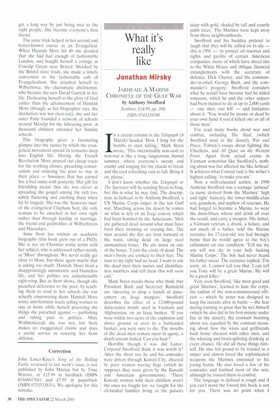What it's really like
Jonathan Mirsky
JARHEAD: A MARINE CHRONICLE OF THE GULF WAR by Anthony Swofford Scribner, £14.99, pp. 260, ISBN 0743239180 In a recent column in the Telegraph (8 March) headed 'How I long for the bombs to start falling,' Mark Steyn wrote, 'This interminable non-rush to non-war is like a long, languorous, humid summer, where everyone's sweaty and cranky and longing for the clouds to break and the cool refreshing rain to fall. Bring it on, please.'
I don't know whether the Telegraph or The Spectator will be sending Steyn to Iraq, but this is what he may find. The description, in Jarhead, is by Anthony Swofford, a US Marine Corps sniper in the last Gulf war. Marching across the desert he comes on what is left of an Iraqi convoy which had been bombed by the Americans: 'Men are gathered dead around what must have been their morning or evening fire. The men around the fire are bent forward at the waist, sitting dead on large steel ammunition boxes.' He sits down on one of the boxes. 'I join the circle of dead. The men's boots are cooked to their feet. The man to my right had no head. I want to ask the dead men their names and identification numbers and tell them this will soon end.'
Mark Steyn mocks those who think that President Bush and Secretary Rumsfeld are 'slavering to drop a bunch of daisycutters on Iraqi moppets'. Swofford describes the effect of a 12,600-pound daisy-cutter bomb. used in Vietnam and Afghanistan, on an Iraqi bunker. 'If you were within two acres of the explosion and above ground or even in a barricaded bunker, you were sure to die. The mouths of the dead men remain open in agony, a death scream halted. Can you hear?'
Horrible though it was, did LanceCorporal Swofford think it was worth it? After the short war he and his comrades were driven through Kuwait City, cheered by poor women waving flags (which he supposes they were given by the Kuwaiti , and American governments). 'These Kuwaiti women with their children aren't the ones we fought for: we fought for the oil-landed families living in the palaces deep with gold, shaded by tall and courtly palm trees.' The Marines were kept away from those neighbourhoods.
Swofford and his buddies pretend to laugh that they will be called on to die — this is 1991 — to protect oil reserves and rights and profits of certain American companies, many of which have direct ties to the White House and oblique financial entanglements with the secretary of defence, Dick Cheney, and the commander-in-chief, George Bush, and the commander's progeny.' Swofford considers what he would have become had he killed someone, which he and the other snipers had been trained to do at up to 2,000 yards — 'one shot, one kill' — and fantasises about it. 'You would be insane or dead by your own hand if you'd killed one or all of those men.'
I've read many books about war and combat, including The Iliad, (which Swofford read in the desert), War and Peace, Tolstoy's essays about fighting the Chechens. and All Quiet on the Western Front. Apart from actual events in Vietnam somewhat like Swofford's, nothing about war has affected me like Jarhead. It achieves what Conrad said is the writer's highest calling: 'to make you see'.
Now a well-educated author, in 1990 Anthony Swofford was a teenage `jarhead' (a name derived from the Marines' high and tight' haircut), the lower-middle-class son, grandson, and nephew of veterans. He had longed to become a Marine, to wear the dress-blues, whore and drink all over the world, and carry a weapon. His father, a Vietnam veteran, a drunk, a failure, and not much of a father, told the Marine recruiter his 17-year-old son had brought home that he would agree to the boy's enlistment on one condition: 'Tell me my son will not die in your holy fucking Marine Corps.' The boy had never heard his father swear. The recruiter replied, 'I'm sorry, sir. I cannot tell you that. I can tell you Tony will be a great Marine. He will be a great killer.'
Very soon Swofford, -like most good and great Marines', learned to hate the corps, the sadism of the non-commissioned officers — which he notes was designed to keep the recruits alive in battle — the fear during training so great that he wet himself (which he also did in his first minute under fire in the desert), the constant boasting about sex, equalled by the constant moaning about how the wives and girlfriends back home cheated with other men, and the whoring and brain-splitting drinking at every chance. He did all these things himself. He also felt proud to be trained as a sniper and almost loved the sophisticated weapons the Marines entrusted to his young hands. He also loved a few of his comrades and loathed most of the rest, although he trusted them in combat.
The language in Jarhead is rough and if you can't stand the f-word this book is not for you. There was no point when I thought it was used inappropriately. Indeed, Swofford convinces me once and for all that the men who go to war and live are spared for the single purpose of spreading bad news when they come home, the bad news about the way war is fought and why, and by whom for whom, and the more men who survive the war, the higher the number of men who might speak.'





































































 Previous page
Previous page